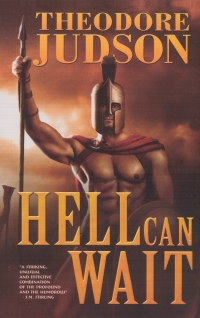| ________________
CM . . . . Volume XVII Number 12. . . .November 19, 2010. 
 |
Hell Can Wait.
Theodore Judson.
Calgary AB: Edge Science Fiction and Fantasy, 2010.
213 pp., pbk., $14.95.
ISBN 978-1-894063-23-4.
Grades 8 and up /Ages 13 and up.
Review by Ronald Hore.
***/4
|
| |
|

excerpt:
"Have a chair, Mr. Maternus," said the demon sitting behind the desk. "Hot enough for you? I know. I know. They tell us all to use cornball stuff like that during our morning meetings. 'Sure,' says the boss, 'of course we use cliches. You'll find worse things down here, you know.' Sit, sit, take a load off."
"What is that tongue you speak?" asked Maternus, and reflectively touched his mouth when he heard himself. "What is this I speak?" he asked. "Why do I understand it?"
"It's English, old sport," said the demon, as he busily searched through the scattered piles of papers for something he could not find. "Nobody uses Latin any more. This is what has, so to speak, taken Latin's place. The language of the new empire. Not even a current scholar of said dead tongue could decipher the legionnaire's lingo you spoke among your mates, old sport. Here we are," he said, locating the files he wanted.
"It sounds like something spoken beyond the Rhine," said Maternus and sat heavily in the chair the demon had indicated. - -
Decimus Maternus Celer has been in Hell for eighteen hundred years, partially because his file was lost. Now he is finally up for his Judgement Day, in front of a review committee comprised of an angel and a demon. Both committee members are after his soul. To achieve their aims, they decide to bring Maternus back to life, give him a series of impossible-sounding challenges, and deposit him in a town in modern Colorado.
Based on an actual historical figure who led a revolt against a corrupt emperor, and was betrayed and executed, Maternus is a large, well-trained Roman soldier, well used to violence. Of course, using violence to achieve his aims during these challenges is not a good option; if he does, the angel loses and the demon wins. For some added motivation, Maternus is also given hints toward a certain additional reward, other than simply escaping Hell, should he succeed.
Maternus finds himself thrust into this very unfamiliar setting, with a few helpful words from the angel, and at least is given the ability to read. He uses this new ability to gain some knowledge of the world he now finds himself in. Along the way, Maternus meets, and often misunderstands, some interesting characters.
While Maternus is the main character in the story, the reader also gets to follow along with the angel, Mr. Worthy, and the demon, Banewill, as they each try to negotiate and scheme to win the contest for their sides. This is not the first time this devious pair have competed.
Told with a well-written blend of history, humour, and personal conflict, this tale will appeal to readers more interested in a good story rather than explosions or excessive violence. The book opens with a one page excerpt from Gibbon's Decline and Fall of the Roman Empire that outlines the story of Maternus, then the main story which takes up 213 pages. Other than the cover, there are no illustrations.
Recommended.
Ronald Hore, involved with writer's groups for several years, retired from the business world in Winnipeg, MB.

To comment on this title or this review, send mail to
cm@umanitoba.ca.
Copyright © the Manitoba Library Association. Reproduction for personal use is permitted only if this copyright notice is maintained. Any other reproduction is prohibited without permission.
NEXT REVIEW |
TABLE OF CONTENTS FOR THIS ISSUE- November 19, 2010.
AUTHORS |
TITLES |
MEDIA REVIEWS |
PROFILES |
BACK ISSUES |
SEARCH |
CMARCHIVE |
HOME |
